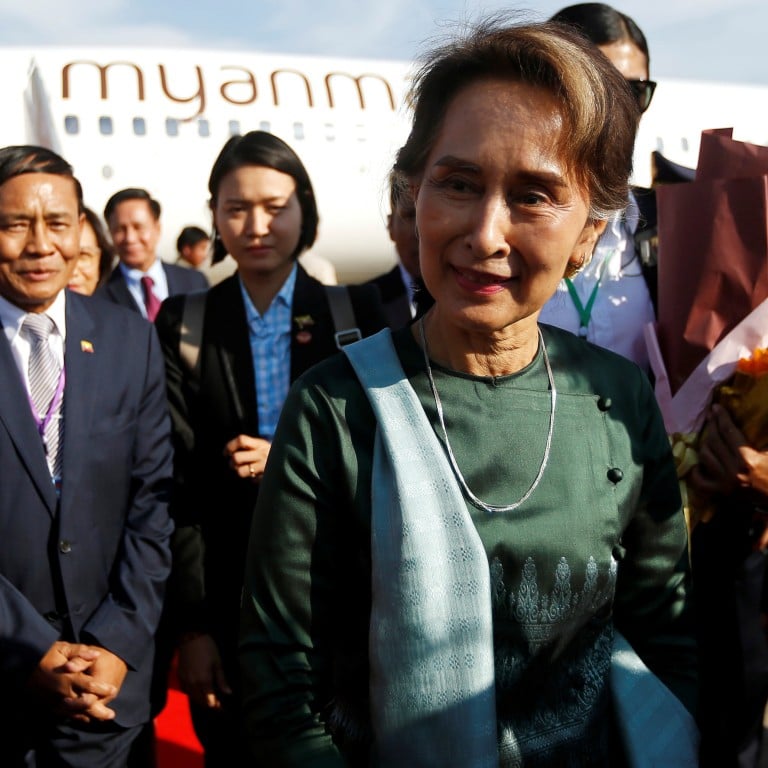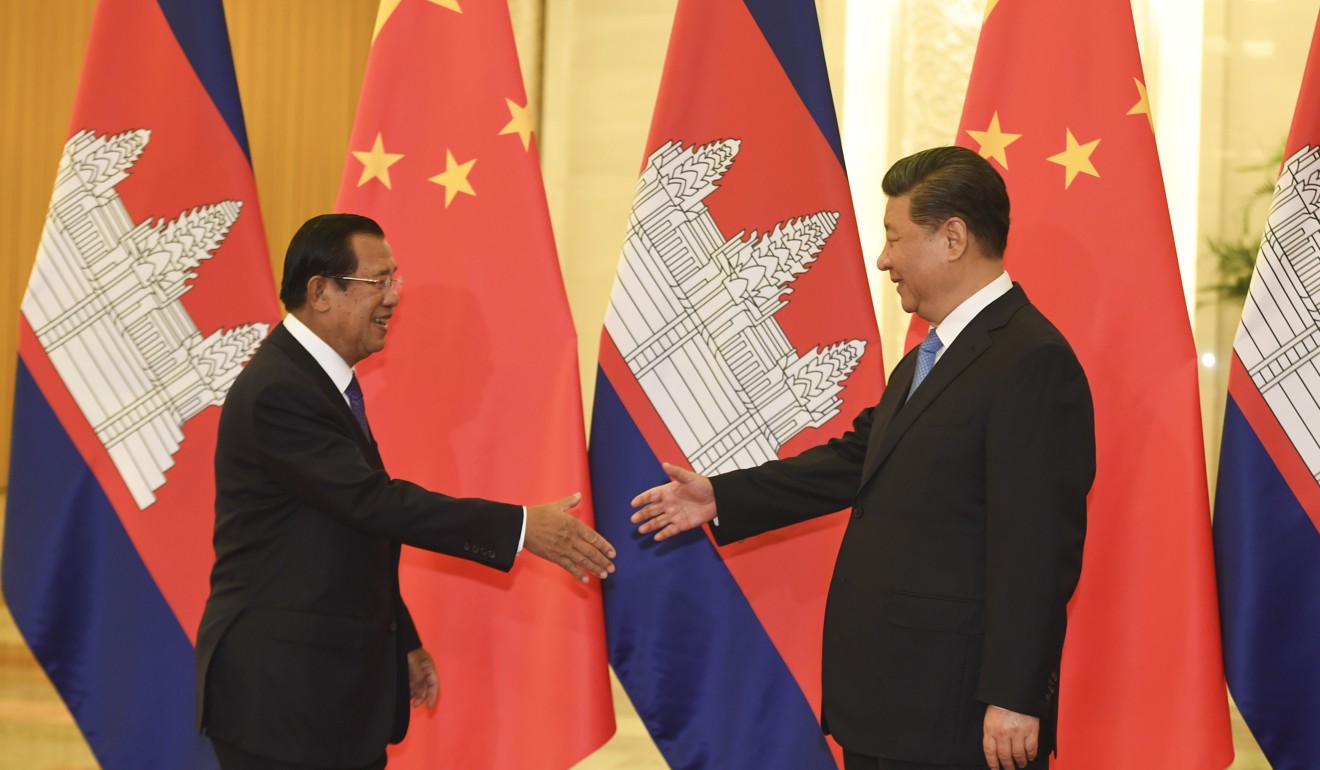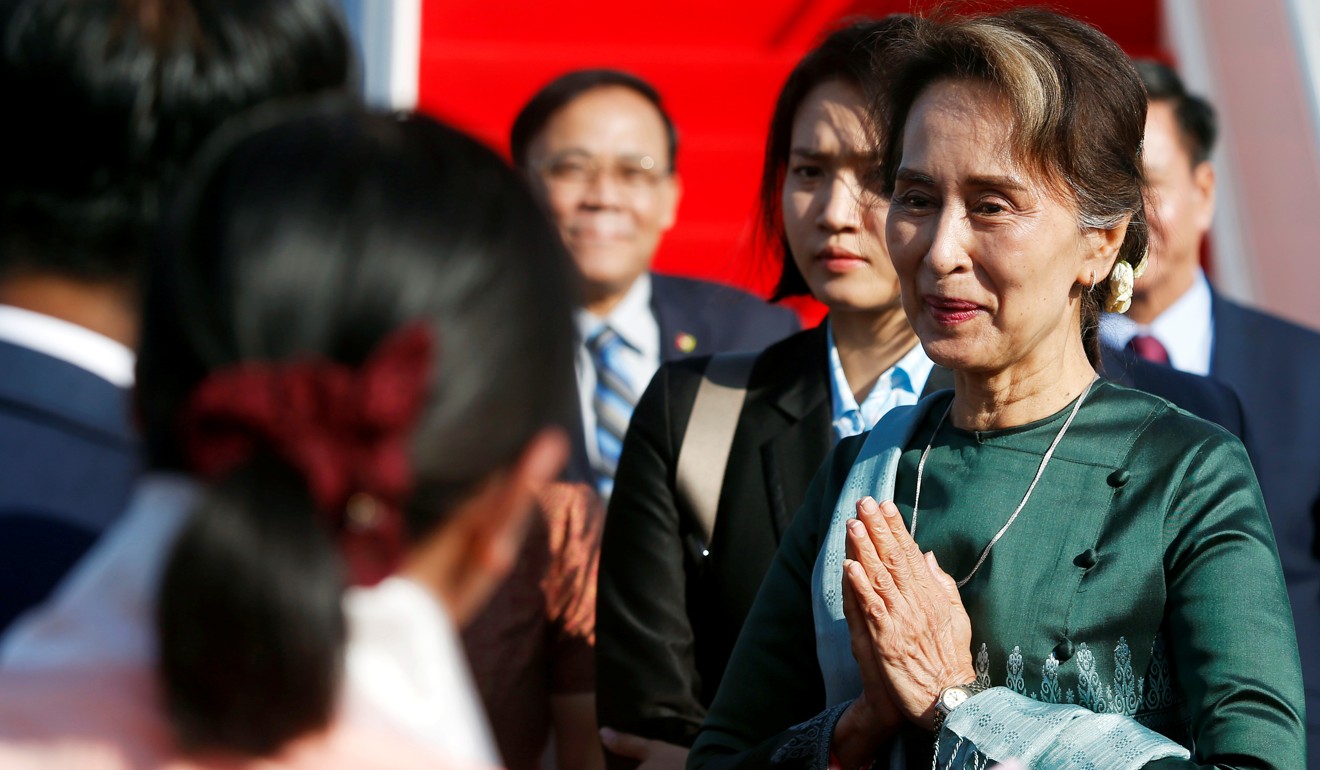
China’s relationship with Asean under scrutiny as Myanmar’s Aung San Suu Kyi makes first visit to Cambodia
- The state counsellor’s trip underlines the similarities between two nations isolated from the international community over human rights abuses
- Naypyidaw and Phnom Penh are also seen as loyal to Beijing, a position that has hampered the Southeast Asian bloc’s effectiveness
According to the Cambodian Ministry of Foreign Affairs, Suu Kyi arrived in Cambodia on April 29, flying from Beijing where she and Cambodian Prime Minister Hun Sen attended the second Belt and Road Forum.
Ear Sophal, author of The Hungry Dragon: How China’s Resources Quest is Reshaping the World, said it is “no coincidence” the leaders are holding bilateral talks directly after meeting in Beijing.
“The deeper ties would be in the form of an axis of Beijing-friendly countries at Asean’s table,” Sophal said. “It can only further empower China. Vietnam and other claimant countries to the South China Sea will feel further isolated.”
Hong Kong-backed casino: Chinese tourists win, poor Cambodians lose
Suu Kyi is on April 30 expected to lay wreaths at the statue of King Sihanouk, who also served as Cambodia’s prime minister before his death in 2012, and pay her respects to King Norodom Sihamoni and the queen mother at the Royal Palace in Phnom Penh.
She will also meet the presidents of the Senate and National Assembly, as well as Hun Sen, before concluding her visit with a trip to the famous temples in Siem Reap.

Cambodia and Myanmar find themselves in similarly precarious positions, as the European Union considers revoking their preferential Everything But Arms (EBA) trade agreement – which allows duty- and quote-free imports to the EU, with the stated exception of armaments – over human rights violations.
Cambodia is in hot water over the arrest of opposition leader Kem Sokha and the dissolution of his Cambodia National Rescue Party (CNRP) before the 2018 national election. The ruling party went on to claim all 125 seats in parliament, extending Hun Sen’s now 34-year grip on power.
Thousands protest China-backed mega-dam in Myanmar
Suu Kyi, a Nobel Peace Prize winner, has been under heavy scrutiny for the genocide against Rohingya Muslims in Myanmar. Once a darling of the international community for opposing the country’s authoritarian military regime, Suu Kyi has had multiple human rights awards revoked for justifying the army’s use of force against the Rohingya, which resulted in more than 10,000 deaths and the flight abroad of some 700,000 refugees.
Despite these similarities, the two leaders make strange bedfellows.
“The difference between Aung San Suu Kyi and Hun Sen is that Aung San Suu Kyi has always been the voice of opposition to military rule and democratic reforms. Cambodia under Hun Sen went from democracy to autocracy,” said regional security analyst Carl Thayer.
Misery loves company
Thayer also said before this visit, the countries had little to do with each other, but “misery loves company”.
He believes the meeting can lend Hun Sen some much-needed legitimacy after his tainted electoral victory last year, and that Suu Kyi will be welcomed in Cambodia rather than scorned.

Cambodia government spokesman Phay Siphan said two of the main reasons for the bilateral meeting were to reaffirm the principle of non-interference and discuss the potential fallout should the EU revoke the EBA agreement.
Cambodia’s championing of non-interference in Myanmar is ironic given that Hun Sen relied on Vietnamese help to overthrow the Khmer Rouge – which committed genocide against Cambodia’s Muslim Cham minority and plunged the country into chaos.
“It is a measure of good relations, certainly there will be more cooperation,” Siphan added.
He insists that outside observers unfairly “accuse” Cambodia and Myanmar of loyalty to China.
“It has nothing to do with China about the cooperation between Myanmar and Cambodia,” Siphan said.
Is Cambodia’s Koh Kong project for Chinese tourists – or China’s military?
But their relationship with China already has implications in Asean.
Cambodia previously vetoed Asean resolutions condemning China’s aggression in the South China Sea, where it is involved in numerous territorial disputes with other Southeast Asian nations. In return, China supports Cambodia economically, pledging this week to “find ways to assist Cambodia” if the EBA withdrawal goes into effect.
Meanwhile China has shielded Myanmar from repercussions over the Rohingya persecution, which has created a regional refugee crisis affecting other Asean members – including Malaysia, where nearly 100,000 Burmese Muslims are seeking asylum, according to the United Nations Refugee Agency.
Mu Sochua, vice-president of the CNRP and a member of Asean Parliamentarians for Human Rights, called for the regional body to be more proactive.
“Asean states should look to work together to boost human rights, not lead a collective race to the bottom,” she told the South China Morning Post.
